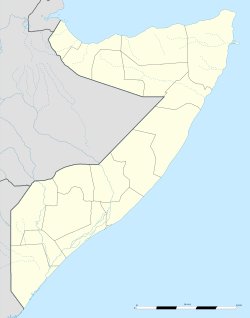Mareergur
Mareergur
Mareer Gur | |
|---|---|
Town | |
 View of Mareergur | |
| Coordinates: 5°45′0″N 46°31′0″E / 5.75000°N 46.51667°E | |
| Country | |
| State | |
| Region | Galguduud |
| District | Dusmareb |
| Elevation | 281 m (922 ft) |
| Population | |
• Total | 50,000 |
| Time zone | UTC+3 (EAT) |
Mareergur (Mareer Gur, also spelled Merergur) is a town located in the Galguduud region within the federal state of Galmudug, Somalia.[1] It lies approximately 30 km south of Dhusamareb, the regional capital.[2]
Geography
[edit]Mareergur is situated in central Somalia, characterized by semi-arid and arid landscapes. The town sits at an elevation of about 281 meters above sea level at coordinates 5°45′N 46°31′E. This location gives it a dry climate typical of central Somali plateau regions.[3]
Demographics
[edit]Mareergur has an estimated population of around 50,000 inhabitants.[4] The town is mainly inhabited by ethnic Somalis, especially members of the Ayr sub-clan of the Habar Gidir, which is part of the larger Hawiye clan-family. Clan structure heavily influences social organization and local governance.[5]
Climate
[edit]Mareergur experiences a hot desert climate (Köppen BWh). Temperatures generally range from 27°C to 35°C throughout the year. The area experiences two rainy seasons: Gu (April to June) and Deyr (October to December), separated by two dry seasons. Rainfall is scarce and unpredictable, impacting both agriculture and livestock activities.[6]
Economy
[edit]The economy of Mareergur is largely based on pastoral livestock. Residents raise camels, cattle, goats, and sheep, selling them in local markets or exporting to other regions.[7] This reliance makes the local economy vulnerable to prolonged droughts and climate changes that directly affect livestock survival and pasture conditions.
In recent years, small-scale businesses such as retail shops, services, transportation, and diaspora remittances have provided some diversification to the town’s economy.[8]
Infrastructure and Services
[edit]Infrastructure in Mareergur remains underdeveloped. Access to clean water, healthcare, and quality education is limited.[9] Roads connecting Mareergur to neighboring cities like Dhusamareb are mostly unpaved, making transportation difficult, particularly during rainy seasons.
International organizations and NGOs are working to improve basic services through community development projects.
Healthcare
[edit]According to regional health surveys, approximately 78% of households have access to improved water sources, while only 49% have adequate sanitation. The total fertility rate is high, averaging 7.3 children per woman. Only 30% of births take place in healthcare facilities, highlighting the need for improved maternal and child healthcare services.[10]
Education
[edit]Literacy rates in Galmudug are relatively low, especially among women. Several initiatives aim to improve educational access, including the construction of schools and teacher training programs. Multiple studies show that investing in education yields positive returns both individually and socially.[11] Education remains a key factor for Mareergur’s socioeconomic development.
Security
[edit]Like many parts of central Somalia, Mareergur faces challenges from armed groups and clan-based conflicts.[12] However, local authorities and traditional elders actively engage in peacebuilding and conflict resolution through customary law (Xeer).
Development Prospects
[edit]Despite existing challenges, Mareergur has significant development potential. Ongoing projects focus on improving infrastructure, healthcare, education, and economic growth. The resilience of the local community and sustained development efforts offer promising prospects for the town’s future.[13]
References
[edit]- ^ "Nine Arrested for Illegal Gun Ownership in Galgadud". Hiiraan Online.
- ^ "Somalia Humanitarian Bulletin January 2021". ReliefWeb.
- ^ Lewis, I. M. (2002). A Modern History of the Somali: Nation and State in the Horn of Africa. James Currey Publishers.
- ^ Population Estimation Survey for Somalia (PESS) 2014 (Report). UNFPA. 2014.
- ^ Hagmann, T. (2014). "Talking Peace in the Ogaden: The Search for an End to Conflict in the Somali Regional State in Ethiopia". Accord.
- ^ Somalia Drought Impact and Needs Assessment (Report). World Bank. 2018.
- ^ "FAO Somalia Livestock Sector Development".
- ^ Somalia Economic Update 2022 (Report). World Bank.
- ^ "Somalia Humanitarian Needs Overview 2023". ReliefWeb.
- ^ Galmudug Health and Demographic Survey 2020 (Report). Somali National Bureau of Statistics.
- ^ Positive return on investment for education
- ^ "Somalia Conflict Complexities and Perspectives". ACCORD.
- ^ Somalia National Development Plan 2020-2024 (Report). Federal Government of Somalia.

